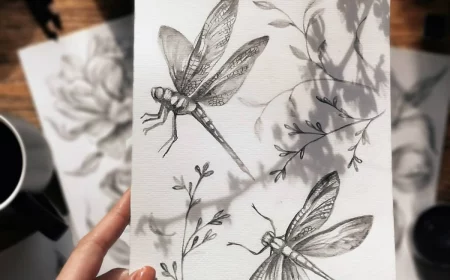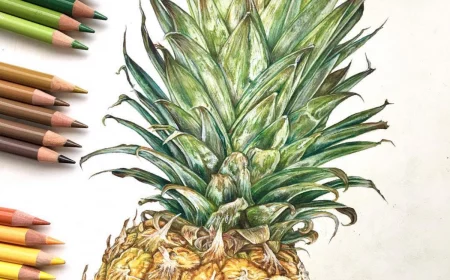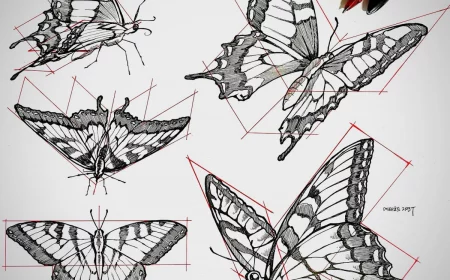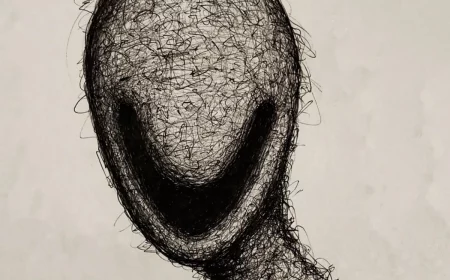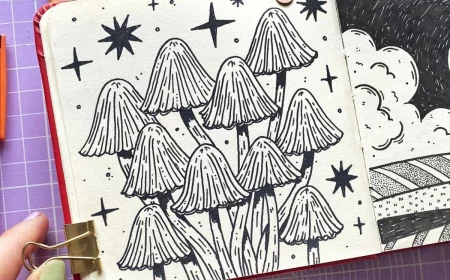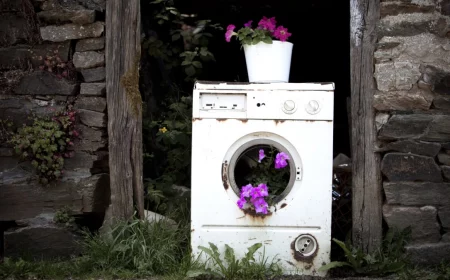How to Doodle Your Way to a Sharper Mind & Better Ideas (Even If You Can’t Draw)
For years, I lived a double life with my pen. In the design studio, doodling was celebrated. We called it ‘thumbnailing’—the messy, exciting first step of any creative project. But in a long meeting? It felt like a crime. I’d be hiding in the margins of my notebook, filling the empty space with patterns and shapes, just hoping my boss wouldn’t notice and think I was spacing out. Honestly, it felt a bit like being back in school, trying not to get caught.
In this article
It took me a long time to realize that the studio sketch and the meeting scribble are actually the same thing. They’re both powerful tools for your brain. Doodling isn’t a sign that you’re unfocused; it’s a clever trick to manage your focus.
And here’s the most important part: you absolutely do not need to be an artist to get all the benefits. In fact, being ‘bad’ at drawing might even be an advantage. This is about making simple marks on a page to improve your focus, boost your memory, and unlock some seriously good ideas.

So, Why Does Doodling Actually Work?
You’ve probably heard someone say that doodling helps them concentrate, and maybe you brushed it off as a nice excuse. But there’s some real science to back it up.
A well-known study shed some light on this. Researchers had a group of people listen to a purposefully boring and rambling voicemail. Half of the group was asked to shade in some shapes on a piece of paper while listening. The other half just listened. Afterwards, everyone was given a surprise quiz on the details from the call.
The results were pretty shocking. The doodlers remembered 29% more information. That’s not a small margin; it’s huge. It proves something really important is going on.
Here’s the simple explanation: when you’re stuck in a boring situation, your brain’s natural tendency is to check out completely. It starts daydreaming, worrying about your to-do list, or replaying that awkward conversation from yesterday. This is your brain’s “autopilot” mode, and it’s a total focus killer.

Doodling gives your brain just enough of a simple task to keep that autopilot from taking over. It’s like a tiny anchor that keeps you in the present moment. Your hand is moving, a small part of your brain is engaged, and the rest of your mental bandwidth is free to absorb what’s actually being said. You’re not being distracted by the doodle; you’re being saved from the much bigger distraction of your own wandering mind.
Your Doodling Toolkit: Gear Up for Success
Okay, you can technically doodle with a half-broken crayon on a napkin. But if you want to make this a real practice, having the right tools makes a huge difference. The right gear just feels good to use, which makes you want to do it more.
For the Analog Fans (Pen and Paper)
- Pens: That cheap ballpoint from the bank will do in a pinch, but they can be skippy and blobby. For a much better experience, I recommend a smooth-writing pen. A Sakura Pigma Micron (the 05 or 08 size is perfect) is a favorite among artists for a reason. They cost about $3 a pop and the ink doesn’t bleed through most paper. A great, easy-to-find alternative is the Pilot G2 gel pen, which you can get anywhere.
- Paper: Thin copy paper is a recipe for frustration when your ink shows through on the other side. A dedicated notebook is the way to go. A simple Moleskine Cahier Journal (a pack of three is usually under $15) or a Leuchtturm1917 notebook gives you quality paper that’s a pleasure to draw on.
Quick tip: To save some cash, check out the house brands at office supply stores. A 5×8 inch gridded notepad is fantastic for pattern doodling; the grid gives you a little structure without getting in the way.

For the Digital Crowd (Tablets and Styluses)
Oh yeah, you can absolutely do this on an iPad or other tablet. The principles are exactly the same. The key is to use a simple app that doesn’t overwhelm you with features. Procreate is amazing, but it can be overkill. Sometimes the basic Apple Notes app or a simple, focused app like Paper by WeTransfer is even better.
A stylus with pressure sensitivity, like an Apple Pencil, is great but not required. The goal isn’t to create a digital masterpiece; it’s to get the same focus-anchoring benefit. Just pick a basic brush, a single color, and go.
Technique 1: Meditative Doodling for Pure Focus
This is your go-to technique for when you need to listen and absorb information, like during a long conference call, a lecture, or while listening to a podcast. The goal here is not to draw anything recognizable. It’s about creating simple, repetitive patterns.

Here’s how to do it:
- Create a container. Lightly draw a box, circle, or any simple shape on your page. This gives your doodle a defined space to live in.
- Divide the space. Draw a few random, squiggly lines to break your container into smaller sections. Don’t think, just draw.
- Fill a section. Pick one of the new, smaller sections and fill it with a single, super-simple pattern. Then, move to the next section and fill it with a different simple pattern.
The magic is in the repetition. You’re just focusing on the physical sensation of making the marks. The contrast between the patterns is what makes the final result look cool, but that’s just a happy accident.
Your Focus-Doodle Starter Pack:
Not sure what patterns to draw? Don’t sweat it. Try one of these—they are impossible to mess up.
- Simple parallel lines (vertical, horizontal, or diagonal)
- Wavy lines that mimic water
- A series of small, unfilled circles
- A basic checkerboard pattern
- Filling the space with tiny triangles or plus-signs
- Simple cross-hatching (lines going one way, then lines crossing over them)
Pause right now. Seriously. Grab a pen and a Post-it note. Draw a small square and fill it with straight, parallel lines. Pay attention to the feeling of the pen moving across the paper. That’s it. That’s the feeling you’re going for.

Technique 2: Conceptual Doodling for Solving Problems
Okay, this is what I use when I’m actively trying to figure something out or brainstorm ideas. It’s a messy, active blend of drawing and writing that helps clarify your thinking. Think of it as a mind map on steroids.
Let’s walk through an example. Imagine you’re trying to come up with a new logo for a local bakery.
- Start with the core idea. Write “New Bakery Logo” in the middle of a blank page and draw a circle around it.
- Branch out with words. From that central circle, draw lines radiating outwards. At the end of each line, write a related concept. You might write “Bread,” “Community,” “Morning,” “Warmth,” and “Traditional.”
- Now, add simple icons. This is the key step. Next to the word “Bread,” draw the simplest loaf shape you can. It can look like a lumpy potato; it doesn’t matter! Next to “Community,” draw two or three stick figures. For “Morning,” a simple sun. These little icons activate a different part of your brain than just writing.
- Find the hidden connections. Now, look at your messy map. You might suddenly see a connection you hadn’t before. Maybe you draw a line connecting your ‘sun’ icon to your ‘bread’ icon. And boom, an idea sparks: what if the logo is a rising sun that’s also shaped like a loaf of bread?
This process of turning abstract words into clumsy shapes is a powerful way to find new, unexpected directions.

Common Hang-Ups (and How to Get Over Them)
Even with the best intentions, a few things can get in your way. Here are the most common ones I see.
- The Pitfall: Feeling self-conscious in a meeting. You’re worried about what your boss or colleagues will think.
- The Fix: Try ‘stealth doodling’. Instead of drawing separate patterns, incorporate the doodling into your actual notes. Thicken the stems of your letters. Fill in all the O’s and B’s. Shade in your bullet points. It looks like you’re just taking very deliberate notes, but you’re getting the same focus benefit. No one will ever know.
- The Pitfall: Trying to make ‘Art’. You get caught up in making the doodle look good, and then it becomes a distraction itself.
- The Fix: Give yourself permission to be messy. Remind yourself that the goal is the process, not the product. If it helps, use a pen you don’t love as much. Or, tell yourself this page is getting thrown away the second the meeting is over. The only ‘good’ doodle is one that helps you think.

A Quick Word on Safety and Etiquette
Believe it or not, you need to be a little careful. If you really get into pattern doodling, you can end up drawing for hours, which can lead to hand cramps or even a repetitive strain injury (RSI). I learned that the hard way. Remember to take breaks. Every 30 minutes or so, put the pen down, stretch your fingers wide, and then make a fist. It’s a tiny thing that makes a huge difference.
And be smart about your workplace. In many creative and tech companies, doodling or sketchnoting in a meeting is seen as a sign of engagement. But in more traditional corporate settings, it can still be misinterpreted as you not paying attention.
My advice? Start small and be discreet. Use the ‘stealth doodling’ tricks. If you feel comfortable, you could even have a quick chat with your manager. Framing it as a tool that helps you focus and retain information can completely change their perception. It’s all about showing that it’s a professional tool, not just a hobby.

At the end of the day, doodling is a quiet, personal skill you build over time. It’s about connecting your hand to your mind. So grab a pen and give your brain the little anchor it needs. You might be surprised by what you come up with.
Inspiration Gallery




The right tool can transform doodling from a scribble to a sensory experience. Don’t underestimate the power of a smooth-flowing pen. The cult-classic Japanese Muji 0.5mm gel pen offers a satisfyingly consistent line, while the widely available Pilot G2 provides a bold, gliding feel. Find a pen that feels good in your hand; the pleasure of the process is half the point.



There is no such thing as a mindless doodle. Those squiggles, lines, and shapes are the by-products of a focused mind.
This insight from Sunni Brown, author of The Doodle Revolution, reframes the act entirely. Your doodles aren’t proof of distraction; they are the visible trail of your brain working to stay engaged and process information.



I have a blank page and a blank mind. What do I even draw?
Forget about creating a masterpiece. Start with the basics. Your brain loves recognizing and creating patterns. Try one of these no-pressure starting points:
- Fill a space with concentric circles.
- Draw a series of parallel lines and then connect them.
- Practice drawing simple 3D cubes from different angles.
- Shade in the holes of the letters on the page.
- Draw spirals, waves, or simple geometric shapes like triangles and squares.



The Golden Rule of Doodling: Banish the eraser. The goal is not a perfect drawing, but a continuous flow of thought. A so-called ‘mistake’ might lead to an interesting new shape or pattern. Embracing the imperfections is key to keeping your analytical brain quiet and letting your intuitive mind play.



Ready to take your scribbles digital? Doodling on a tablet or phone offers the magic of layers and unlimited colors without the mess. It’s a fantastic way to experiment.
- Procreate: The gold standard for iPad users, offering infinite brushes.
- Paper by WeTransfer: A beautifully simple interface that feels like a real journal.
- Tayasui Sketches: A free app with surprisingly realistic tool simulations.



- Calms an anxious mind.
- Improves focus on repetitive tasks.
- Creates beautiful, intricate patterns from simple strokes.
The secret? It’s a recognized technique called the Zentangle® Method. It involves drawing structured patterns using a combination of dots, lines, and curves. It’s often described as ‘artistic meditation.’




Fineliner Pen: Delivers a crisp, precise, and consistent line. Perfect for detailed patterns and architectural shapes. The Sakura Pigma Micron is a classic for a reason—its archival ink won’t bleed or fade.
Ballpoint Pen: Offers variation in line weight and shading based on pressure. Ideal for quick, expressive sketches and a more ‘sketchbook’ feel. The humble BIC Cristal is surprisingly versatile.
There’s no wrong choice; it’s all about the desired effect.



Think of doodling as a way to build your own private visual language. Start a collection of simple icons you can draw in seconds to represent common concepts. This is the foundation of ‘sketchnoting’.
- A lightbulb for an ‘idea’.
- An arrow for ‘process’ or ‘next step’.
- A heart for a ‘key takeaway’ or ‘what I liked’.
- A simple clock for ‘time’ or ‘deadline’.



A study found that the simple act of drawing can significantly reduce levels of cortisol, the body’s main stress hormone.
This means your meeting doodles are more than just a focus tool; they’re a form of self-regulation. When you’re sketching simple shapes, you’re giving your brain a mini-break, calming your nervous system and allowing you to handle stressful information more effectively.



Is it rude to doodle during a meeting or a lecture?
It’s all about intent. If you’re openly drawing a caricature of the speaker, then yes. But if you’re quietly using doodles in the margin to process what’s being said, you’re actually practicing a form of active listening. Many find that if they explain, ‘I doodle to help me concentrate,’ colleagues and managers are surprisingly understanding.



Add a little flair to your simple doodles with basic techniques. You don’t need an art degree to create depth and interest. Try simple cross-hatching (drawing parallel lines in opposite directions) for shadow, or stippling (using small dots) to create texture. Even a single highlighter, like a mild-toned Zebra Mildliner, can be used to add a pop of color that draws the eye to the most important part of your doodle.



Important point: You don’t need expensive equipment. Some of the most brilliant ideas in history started as scribbles on a napkin. A cheap notepad and a basic pen are all you need to unlock the cognitive benefits of doodling. The barrier to entry is zero.




- Dotted grid paper, like in a Leuchtturm1917 notebook, provides subtle guidance for structure without the rigidity of lines. It’s a favorite for bullet journaling and visual notetaking.
- Blank paper, found in a Moleskine Art sketchbook, offers complete freedom for organic shapes and unbounded creativity.



Go beyond random shapes and use doodling to solve a specific problem. Grab a blank page and visually map it out. Use arrows to show connections, boxes to contain concepts, and simple stick figures to represent people or roles. This method, called ‘visual thinking,’ can reveal solutions that a simple text-based list would never uncover.



Did you know that 26 U.S. Presidents were known doodlers? John F. Kennedy’s notebooks were filled with sketches of sailboats, while Ronald Reagan often drew cowboys and horses during high-level meetings.



What if I just… hate what I draw?
That’s your inner critic talking, and it’s missing the point. Reframe the goal: you are not trying to create a piece of art for a gallery. You are creating marks on a page to engage your brain. The final product is irrelevant. The ‘ugly’ doodle that helped you absorb 30% more information is a massive success.



- Find connections between ideas more easily.
- Remember key points from a meeting or lecture days later.
- Make your notes more engaging to review.
The trick? Combine your words with your doodles. This is called ‘sketchnoting.’ Simply connect a written point to a simple icon with an arrow. This dual-coding (using words and images) cements information in your memory much more effectively than text alone.



Black & White: Doodling with a single black pen, like the popular Faber-Castell Pitt Artist Pen, is an exercise in form, line, and texture. It’s minimalist, calming, and forces you to focus on the shape of things.
A Pop of Color: Introducing just one or two colors can add emotion and hierarchy. A single red Tombow Dual Brush Pen can highlight a key idea or add a splash of energy to an otherwise monochrome page.
Start with black and white, and add color with intention.




Your doodle journal is for you first and foremost. There’s no obligation to have an ‘Instagram-worthy’ page every time you put pen to paper. Allow it to be a messy, private, and judgment-free zone. It’s a playground for your mind, not a performance for an audience.



The brain’s ‘Default Mode Network’ is what activates when we’re idle, leading to daydreaming and mind-wandering.
Doodling provides this network with a simple, low-stakes task. It’s just enough to keep it occupied and prevent it from drifting off completely during a boring task, yet not so demanding that it distracts you from listening. It’s the ultimate cognitive sweet spot.



Think of your doodles as an idea incubator. Don’t just draw what you see; draw abstract concepts. What does ‘synergy’ look like? Can you doodle the feeling of ‘frustration’? This practice of translating abstract thoughts into visual marks can unlock unexpected connections and creative solutions long after you’ve put the pen down.



Stuck in a creative rut? Try a simple one-day doodle challenge to get things moving. The constraints can spark creativity.
- Doodle your favorite food.
- Draw an object on your desk with your non-dominant hand.
- Create a pattern using only straight lines.
- Illustrate the weather outside your window.



Do I need an expensive iPad and Apple Pencil to start digital doodling?
Absolutely not. You can start with free apps on your phone and a simple, inexpensive capacitive stylus (the kind with the soft, rubbery tip). If you want more precision for a home computer setup, an entry-level Wacom One tablet offers a fantastic pen-on-screen experience for a fraction of the cost of a pro device.



Your brain dedicates a surprising amount of processing power to your hands. The act of drawing stimulates parts of the brain involved in motor skills, sensory feedback, and spatial awareness simultaneously.
This physical engagement is why doodling feels so different from passively listening or staring. You are lighting up multiple neural pathways at once, creating a richer mental state that is more receptive to new information.


Move beyond simple doodling and explore the world of ‘visual journaling.’ This practice combines doodles, sketches, handwritten notes, and even collage elements like ticket stubs or photos. It’s a powerful way to document your life, process emotions, and create a rich, personal artifact that is more evocative than a simple diary.

